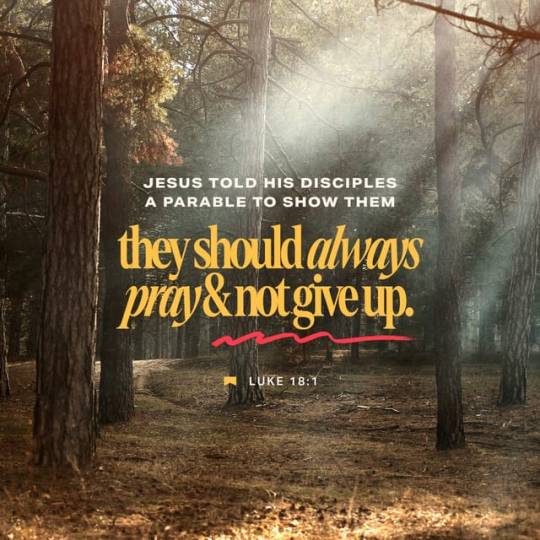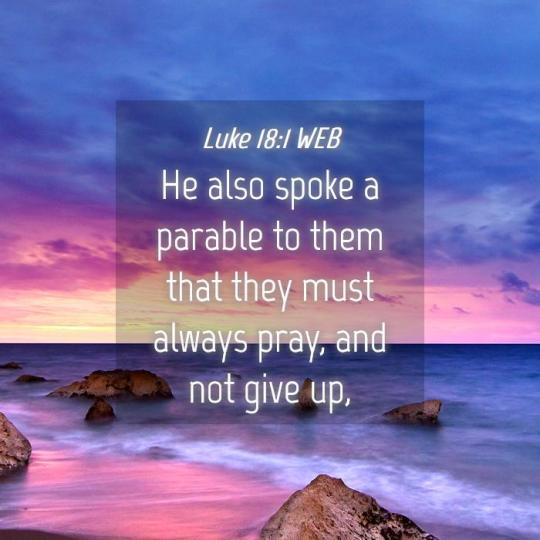#parable of the Persistent Widow
Explore tagged Tumblr posts
Text

The Parable of the Persistent Widow
1 And he told them a parable to the effect that they ought always to pray and not lose heart. 2 He said, “In a certain city there was a judge who neither feared God nor respected man. 3 And there was a widow in that city who kept coming to him and saying, ‘Give me justice against my adversary.’ 4 For a while he refused, but afterward he said to himself, ‘Though I neither fear God nor respect man, 5 yet because this widow keeps bothering me, I will give her justice, so that she will not beat me down by her continual coming.’” 6 And the Lord said, “Hear what the unrighteous judge says. 7 And will not God give justice to his elect, who cry to him day and night? Will he delay long over them? 8 I tell you, he will give justice to them speedily. Nevertheless, when the Son of Man comes, will he find faith on earth?” — Luke 18:1-8 | English Standard Version (ESV) The Holy Bible, English Standard Version. ESV® Text Edition: 2016. Copyright © 2001 by Crossway Bibles, a publishing ministry of Good News Publishers. Cross References: Exodus 22:23; Psalm 88:1; Proverbs 20:6; Isaiah 40:27; Isaiah 40:31; Isaiah 62:7; Matthew 5:25; Matthew 5:45; Luke 7:13; Luke 7:19; Luke 11:8; Luke 17:26; Luke 20:13; 1 Corinthians 9:27; Hebrews 12:9; James 2:4
Read full chapter
What can we learn from the parable of the persistent widow and unjust judge?
#Jesus#teaching#parables#parable of the Persistent Widow#justice#Luke 18:1-8#Gospel of Luke#New Testament#ESV#English Standard Version Bible#Good News Publishers#Crossway Bibles
13 notes
·
View notes
Text
youtube
Persevere! The Devil Won't Quit! We Must Never Give Up!
Website GloryToGodVideos.com
#antichrist trump#antichrist#trump antichrist#the antichrist#the beast#bible study#keep on keeping on#parable of the persistent widow#Youtube
1 note
·
View note
Text
The Parable Of The Persistent Widow
And he told them a parable to the effect that they ought always to pray and not lose heart. He said, “In a certain city there was a judge who neither feared God nor respected man. And there was a widow in that city who kept coming to him and saying, ‘Give me justice against my adversary.’ For a while he refused, but afterward he said to himself, ‘Though I neither fear God nor respect man, yet…
View On WordPress
0 notes
Text










🇵🇷 VBS at San Pablo is continuing this week. Our lessons and crafts have been in relation to the Fruits of the Spirit and some parables from the New Testament ranging from The Good Samaritan to The Persistent Widow, and the Mustard Seed. 🎨🍎🍋🍓🍇🍍
#vbs#kids arts and crafts#The Fruits of the Spirit#New Testament Bible stories#Parables of Jesus#The Good Samaritan#The Persistent Widow#The Parable of the Mustard Seed#youth camp#youth ministry
1 note
·
View note
Text
Christian faith commends those who are relentless in their pursuit of justice, especially those who do so with limited access to power and great personal risk. I’m reminded of the parable Jesus tells his disciples about a widow and an unjust judge (Luke 18:1-8). The widow, Jesus explains, is petitioning for justice from “a judge who neither feared God nor had respect for people.” Each time the judge withholds justice, the widow returns, disrupting the court, bothering the judge, and generally raising a ruckus. Eventually, the judge relents — apparently from sheer annoyance; scripture recounts the judge thinking to himself: “I will grant her justice, so that she may not wear me out by continually coming” (v.5). At the time Jesus told the parable, widows lacked both protection and financial means. But despite her seemingly powerless position, this woman used what little social capital she had to seek justice. For Sister Barabara Reid, a Catholic feminist theologian, the parable illustrates Jesus’ invitation to find power in “apparent powerlessness.” The widow does not wither in the face of an unjust, powerful judge, Sr. Reid writes in her commentary on the women in the book of Luke. Instead of taking the judge’s refusal of justice as the only solution, the widow continues to face injustice head on, to name it as such, and to reject it until it’s set straight.
48 notes
·
View notes
Photo

The Parable of the Persistent Widow ~ Luke 18: 1-8
Then Jesus told his disciples a parable to show them that they should always pray and not give up. He said: “In a certain town there was a judge who neither feared God nor cared what people thought. And there was a widow in that town who kept coming to him with the plea, ‘Grant me justice against my adversary.’
“For some time he refused. But finally he said to himself, ‘Even though I don’t fear God or care what people think, yet because this widow keeps bothering me, I will see that she gets justice, so that she won’t eventually come and attack me!’”
And the Lord said, “Listen to what the unjust judge says. And will not God bring about justice for his chosen ones, who cry out to him day and night? Will he keep putting them off? I tell you, he will see that they get justice, and quickly. However, when the Son of Man comes, will he find faith on the earth?”
Via Verse of the Day - Luke 18:1
#Jesus#parables#Bible verses#scripture#persistence#pray#don't give up#justice#adversary#God#Lord#chosen ones#Son of Man#faith
16 notes
·
View notes
Note
I was listening to a brief debate between a Protestant and a Catholic about Mary & whether or not she was sinless. I'm not Catholic myself, but I felt that the Catholic didn't represent his position well. The Protestant said that scripture had evidence of Mary sinning. He cited the passage of the Wedding at Cana in John 2, saying that Mary was wrong to ask Jesus to do a miracle when He did not intend to start his ministry yet. Then he cited Luke 1, talking about how Zachariah was punished for doubting the angel Gabriel when he told him he would have a sin. He argued that Mary sinned in the same way by doubting the angel when he told her she would conceive because she was a virgin. Again, I'm not a Catholic so my church doesn't try to argue scripture teaches Mary was sinless. But I didn't see the Protestant's citations as proof that Mary's sins were recorded in scripture. I think those verses show that Mary is human and not omniscient. What's your take.
Another thing mentioned in the debate was whether or not Mary needed to be conceived without sin in order to have Jesus. The Catholic said Mary could not carry Jesus in sin. The Protestant said that if Mary had to be sinless to conceive the sinless Jesus, then Mary's parents would have to be sinless in order to conceive her. When the Catholic said this didn't apply to Mary, the Protestant replied by saying that in that case, Mary was a greater "god" than Jesus because she could be born sinless from sinful parents. Have you come across this sort of argument in the past?
Hello! Going to answer this kind of quickly, because I would like to go to sleep soon.
I think using John 2 as an example of Mary sinning is an objectively stupid argument, especially in light of Jesus using the Parables of the Persistent Widow and Friend at Midnight in Luke 18 and Luke 11, respectively, in order to say something about the nature of justification and prayer, respectively. Mary continues to plead with her Son, and then tells the servants to "do whatever [God] tells you." If Mary is sinning in this verse, so is every Christian who ever persists in praying for an intention that isn't answered right away.
I think that using Luke 1 is a better potential argument, at least at first glance, because (at first glance) it does in fact seem that Mary is doing just what Zachariah did and was punished for. But, if they are qualitatively similar responses.... why is Zachariah punished, but Mary not? The Church Fathers make their opinion clear; in the words of Maximus of Turin, Zachariah is "unbelieving," and Mary "believing." Zachariah does not believe that it is possible for his wife to get pregnant, while Mary wonders how she will get pregnant when she has not touched a man. It's a difference of scoffing at the miracle vs. wondering how the miracle will be accomplished. This is a view also held by Saints Ambrose, Augustine, Bede, and Justin Martyr.
I think the Catholic commentator made a blunder by trying to defend the (indefensible) claim that Mary needed to be sinless to carry Christ in her womb; I really don't think that you can make an argument for necessity for the Immaculate Conception, but rather an argument for its fittingness. I have seen people argue for its necessity (something not even the Blessed Duns Scotus, champion of the Immaculate Conception belief, did), but I think that it is mostly an attempt to double-down on the doctrine and emphasize its importance rather than a well thought out argument for its truthfulness.
22 notes
·
View notes
Text

16th November >> Fr. Martin's Reflections/Homilies on Today's Mass Readings for Saturday, Thirty Second Week in Ordinary Time (Inc. Luke 18:1-8): ‘When the Son of Man comes, will he find any faith on earth?’.
Saturday, Thirty Second Week in Ordinary Time
Gospel (Except USA) Luke 18:1-8 The parable of the unjust judge.
Jesus told his disciples a parable about the need to pray continually and never lose heart. ‘There was a judge in a certain town’ he said ‘who had neither fear of God nor respect for man. In the same town there was a widow who kept on coming to him and saying, “I want justice from you against my enemy!” For a long time he refused, but at last he said to himself, “Maybe I have neither fear of God nor respect for man, but since she keeps pestering me I must give this widow her just rights, or she will persist in coming and worry me to death.”’ And the Lord said ‘You notice what the unjust judge has to say? Now will not God see justice done to his chosen who cry to him day and night even when he delays to help them? I promise you, he will see justice done to them, and done speedily. But when the Son of Man comes, will he find any faith on earth?’
Gospel (USA) Luke 18:1-8 Will not God then secure the rights of his chosen ones who call out to him day and night?
Jesus told his disciples a parable about the necessity for them to pray always without becoming weary. He said, “There was a judge in a certain town who neither feared God nor respected any human being. And a widow in that town used to come to him and say, ‘Render a just decision for me against my adversary.’ For a long time the judge was unwilling, but eventually he thought, ‘While it is true that I neither fear God nor respect any human being, because this widow keeps bothering me I shall deliver a just decision for her lest she finally come and strike me.’” The Lord said, “Pay attention to what the dishonest judge says. Will not God then secure the rights of his chosen ones who call out to him day and night? Will he be slow to answer them? I tell you, he will see to it that justice is done for them speedily. But when the Son of Man comes, will he find faith on earth?”
Reflections (8)
(i) Saturday, Thirty Second Week in Ordinary Time
Jesus was aware that there was always a temptation for people of faith to lose heart, especially when they found themselves faced with hostility. According to today’s gospel reading, Jesus’ parable of the widow and the judge was about the need to pray continually and never lose heart. It portrays a widow who refuses to lose heart even when repeatedly faced with an unjust judge who refused to defend her rights, as he was obliged to do. There was every reason for her to lose heart. The judge was a powerful man and she was a powerless woman. Yet, she persevered with her plea for justice and eventually wore down the unjust judge. Jesus sees in the dogged perseverance of this widow the kind of faith that his followers need to have. That is why in his comment on the parable, Jesus asks the question, ‘When the Son of Man comes, will he find any faith on earth?’ Will he find the kind of persevering faith that the widow displayed or will he find that people of faith have lost heart in the face of evil and injustice? The introduction to the parable suggests that it is continuous prayer that gives rise to persevering faith, a faith that never loses heart, ‘Jesus told his disciples a parable about the need to pray continually and never lose heart’. We give expression to our faith in calm, trusting, constant prayer, but such prayer also keeps our faith strong, especially in the face of hostility, injustice and evil. In prayer we open ourselves to receive the strength that the Lord gives which allows us to face what we could not otherwise face if left to our own resources. As Saint Paul says in his letter to the Philippians, ‘I can do all things in him who strengthens me’.
And/Or
(ii) Saturday, Thirty Second Week in Ordinary Time
The temptation to lose heart is always with us. We can be very tempted to discouragement especially in the times in which we live. As people of faith we can be tempted to lose heart in these difficult days for the church. According to this morning’s gospel reading it was that temptation of believers to lose heart that Jesus had in mind when he spoke the parable of the widow and the unjust judge. Here was a woman who refused to lose heart, even though she was facing a judge who neither feared God nor had any respect for other people. This powerless widow was being faced down by a powerful judge; the odds were all stacked against her. Yet, she refused to give up because she knew that justice was on her side. She refused to lose heart. Jesus puts this woman before us as a model of persevering faith in the face of almost insurmountable obstacles. At the end of his comment on this parable, Jesus asks the question, ‘When the Son of Man comes, will he find any faith on earth?’ Jesus is asking if he will find the kind of resilient faith that typified the widow or, rather, will he find that people have lost heart and given up the struggle to believe. God’s faithfulness is not in question. The question mark is over our faithfulness. According to Luke Jesus spoke this parable about the need to pray continually and never lose heart. The primary way we keep faithful when times are difficult is through prayer.
And/Or
(iii) Saturday, Thirty Second Week in Ordinary Time
The figure of the widow in that parable is a wonderful portrayal of the refusal to get discouraged, even when everything goes against you and you come up against the worst instincts of other people. The widow encountered a judge who had no respect for God or other people, and yet she kept coming to him until she got the justice she was entitled to. Jesus paints this picture of a persevering widow who refuses to get discouraged because it captures the kind of faith that he is looking for from his disciples. Having spoken the parable, Jesus asks the question, ‘When the Son of Man comes, will he find any faith on earth?’ Jesus is asking, when he comes back at the end of time, will be find a faith which has the same quality of dogged perseverance that the widow displayed. Jesus is calling for a faith that endures, that refuses to give up, even when all the supports for faith seem to be taken away. These have been difficult times for people of faith. We have all experienced the temptation to discouragement. Yet, Jesus is saying in this morning’s gospel reading that to be a believer is to be a persistent believer. The supreme example of a persistent believer was Jesus himself. In spite of the evil he encountered in various forms, he remained faithful to the end, even as he hung on the cross. The widow is a Jesus figure. Like her, we are all called to have something of Jesus’ persevering faith.
And/Or
(iv) Saturday, Thirty Second Week in Ordinary Time
It is often the case that some of the characters in the parables that Jesus speaks often leave a lot to be desired. That is the case with the judge in this morning’s parable. He is described as someone who had ‘neither fear of God nor respect for man’. For a long time he refused to give justice to the widow who kept coming to him. Perhaps being a widow she could not offer him any financial incentive and that was what he was used to. This kind of scenario was part of life that Jesus clearly observed. Yet, Jesus was able to take an unsatisfactory situation like this and show how it had some redeeming feature that could speak to us of our relationship with God. The redeeming feature in this situation was the widow and her refusal to give up hope or to lose heart. She kept seeking justice for herself in spite of the evil that she was up against. Eventually, she wore the judge down and she received the justice she was entitled to. Jesus is saying that we have something to learn from this widow. God is not like the judge in the story. As Jesus says, God will see justice done to those who cry out to him day and night. The question is, ‘Are we like the widow?’ That is the question Jesus asks at the end of the parable, ‘When the Son of Man comes, will he find faith on earth?’ Will he find the kind of persevering faith that the widow displayed, a faith that endures even in the face of repeated disappointment? Luke’s introduction to Jesus’ parable suggests that this kind of faith finds expression in a prayer that is constant and persistent, trusting and calm.
And/Or
(v) Saturday, Thirty Second Week in Ordinary Time
As believers in today’s world, it can be tempting to lose heart at times. We can sense that faith in God and in his Son Jesus, being part of the faith community we call church, is not greatly valued by today’s commentators. We can also lose heart as believers for more personal reasons. We encounter some great suffering and we wonder where God is in it all. We feel some injustice has been done to us and we conclude that God has not stood by us. According to today’s gospel reading, Jesus spoke the parable of the judge and the widow to encourage his disciples not to lose heart but to keep on praying, to pray continuously, even in times of great darkness. By means of this parable Jesus is encouraging us to have a persistent faith. The widow is an example of such persistent faith. When an injustice was done to her, she did not lose heart. She kept hammering away at the judge who alone could grant her justice until he caved in to her demands, fearful perhaps that she would resort to violence if he didn’t respond to her. Jesus is encouraging us to have something of the gutsy determination of the widow. Our persistent prayer is not to an unjust judge who couldn’t care less about God or his fellow human beings. We pray to a God who is passionately concerned about us. All the more reason why we should have a persistent faith that finds expression in continual prayer. Having spoken the parable, Jesus asks the question, ‘When the Son of Man comes will he find any faith on earth?’ When he comes at the end of time, will he find people of the kind of persistent faith displayed by the widow, or will his disciples have lost heart by then, worn down by the trials of life. It is a question that puts it up to us, in the words of the letter to the Hebrew, ‘to run with perseverance the race that is set before us, looking to Jesus the pioneer and perfecter of our faith’.
And/Or
(vi) Saturday, Thirty Second Week in Ordinary Time
The situation that Jesus depicts in this morning’s parable is one that will always have a contemporary ring to it. A woman without status in the culture looks for justice from a powerful figure whose responsibility it is to see that justice is done, and, yet, for long periods her legitimate pleas for justice go unheard. A vulnerable individual finds herself up against a powerful institution and, even though she has right on her side, she is ignored. Such a scenario can be found in every age. Yet, this story ends up having an unexpected ending. The powerless woman turns out to be powerful after all; the powerful judge becomes powerless before the woman’s persistent plea. In his comment on the parable, Jesus emphasizes that God is not like the judge in the story. The judge neither feared God nor respected people. God, in contrast, is a God of justice who, at the end of the day, will ensure that those who are deprived of justice will receive it. If the widow never lost heart even though she was up against an unjust judge, then surely we need not lose heart before the God whom Jesus reveals. Surely we can be faithful and persevering in our pleas, our prayers, to the Father of Jesus who is also our Father. Yet, the question Jesus asks at the end of the gospel reading raises the possibility that we may not be as faithful and persevering as the widow was, ‘When the Son of Man comes, will he find any faith on earth?’ Jesus implies that faith, if it is to endure, must find expression in continual and persevering prayer.
And/Or
(vii) Saturday, Thirty Second Week in Ordinary Time
The depiction of the widow in today’s parable is of a very strong woman who will stop at nothing to get justice for herself. When an injustice is done to us or to someone else, it will often galvanize us into action on our own behalf or on behalf of others. People will fight tooth and nail to get justice for themselves and for those who are dear to them. The widow in the parable is clearly a fighter. She is up against an unjust judge, which is a contradiction in terms. She is a vulnerable woman, a widow, who takes on a powerful man, a judge. Yet, in this unequal contest, it is the widow who emerges victorious. She wears down the unjust judge until he gives her what she wants, what she is entitled to. While the judge is depicted in our gospel reading as saying, ‘I must give this widow her just rights, or she will persist in coming and worry me to death’, the more literal translation of ‘worry me to death’ would be ‘give me a black eye’. Jesus sees in this feisty widow a quality that his disciples need. They will need something of her persevering and trusting faith, the kind of faith that remains strong in the face of injustice and rejection. When Jesus asks in his comment on the parable, ‘When the Son of Man comes, will he find any faith on earth?’ he wonders aloud whether he will find people of such persevering and enduring faith when he comes at the end of time. Luke’s introduction to Jesus’ parable suggests that such persevering faith, a faith that doesn’t lose heart, is the fruit of continual prayer. The faith that endures to the end is ultimately a gift from God that is given to those who keep opening themselves to receive it in prayer.
And/Or
(viii) Saturday, Thirty Second Week in Ordinary Time
It can be tempting for many people to lose heart in these days. We feel that so much has been put on hold. We seem to be waiting endlessly for things to come right. People of faith miss not being able to gather with other believers to celebrate Mass. Priests feel the loss of the community of faith at Mass. The parable in today’s gospel reading speaks directly into that situation. The widow had many reasons to lose heart. Even though she had right on her side and was entitled to receive justice from the judge, she had the misfortune to come up against a judge who had no fear of God or respect for others. She could easily have given up but she didn’t. She somehow found the energy to keep coming to the judge until, eventually, the judge, for reasons of self-interest, gave her the justice she was entitled to all along. The judge was a powerful figure in that culture and the woman, as a widow, had no power. She was among the vulnerable and weak. Yet, she proved stronger than the judge in the end. She never lost heart. Jesus spoke that parable to encourage all of us to keep the faith, to keep praying to God, never giving up hope, never losing heart. We have all the more reason than the widow never to lose heart because she was up against an unjust judge whereas we are engaging with a loving God who cares for us in all the details of our lives. Yet, at the end of the gospel reading, Jesus wonders aloud if he will find the kind of persevering faith among his followers that was displayed by the woman. ‘When the Son of Man comes, will he find any faith on earth?’ Perhaps we could each answer that question of Jesus this morning by saying, ‘Yes, you will’. The gospel reading encourages us to resist the temptation to lose heart. It calls on us to keep praying, trusting that the Lord will not fail us in the end.
Fr. Martin Hogan.
3 notes
·
View notes
Text
Saturday of week 32 in Ordinary Time: PERSISTENCE IN PRAYER BEARS FRUITS
Luke 18:1-8
There are various forms of prayer are presented in the Catechism of the Catholic Church (CCC 2623-2649). These various forms include prayer of blessing or adoration, prayer of petition, prayer of intercession, prayer of thanksgiving, and prayer of praise. These prayers could be verbal or silent. We may adapt various forms of prayer to express dependency in God.
In the Gospel reading of today. Jesus narrates and set example of a parable of a widow, who has been persistently asking for the mercy of the king.
To persist in prayer and not give up does not mean endless repletion or painfully long prayer sessions. Always means keeping our requests constantly before God as we live for him day by day, believing he will answer. When we live by faith, we are not to give up. God may delay answering, but his delays always have good reasons. As we persist in prayer, we grow I character, faith and hope.
Widows and orphans were among the most vulnerable of all God’s people, and both Old Testament prophets and New Testament apostles insisted that these needy people be properly cared for (Exodus 22:22-24; Isaiah 1:17; 1 Timothy 5:3; James 1:27).
If unjust judges respond to constant pressure, how much more will a great and loving God respond to us. If we know he loves us, we can believe he will hear or cries for help.
Do you say the prayer or make the prayer?
How much faith do you have in God?
Are you kind towards people who need your help?
PRAYER:
Loving Father in heaven, thank you for your kindness, mercy and compassion. You are our good father, the just judge. Thank you for providing everything that we need. Often, we give up our hope and trust in you, especially when things do not happen according to our plan. We ask your mercy Lord, so that we may learn to submit all our hope in you alone. Amen
8 notes
·
View notes
Text

LIBERATED OUT OF EXCUSES INTO COURAGE
Luke 18: 1-8 - Then He spoke a parable to them, that men always ought to pray and not lose heart saying: "There was in a certain city a judge who did not fear God nor regard man. Now there was a widow in that city; and she came to him, saying, 'Get justice for me from my adversary.'
And he would not for a while, but afterward he said within himself, 'Though I do not fear God nor regard man, yet because this widow troubles me I will avenge her, lest by her continual coming she weary me.'"
Then the Lord said, "Hear what the unjust judge said. And shall God not avenge His own elect who cry out day and night to Him, though He bears long with them? I tell you that He will avenge them speedily, nevertheless, when the Son of Man comes, will He really find faith on the earth?"
Jesus challenges our modern traditions. He asks, "When the Son of Man comes, will He find faith on the earth?" His question is a warning to Christians who would limit the power of God at the end of the age. Jesus is calling us to resist the downward pull of our traditions; He is asking us individually, "Will I find faith in you?
Jesus associates faith with "day and night" prayer (Luke 18:7). He is not asking, "Will I find correct doctrines in you?" The Lord's question does not so much concern itself with our head as with our heart. What we believe is important, but how we believe is vital in securing the help of God.
Indeed, procuring the SUPERNATURAL HELP OF GOD is exactly the point of Jesus' parable in Luke 18. His intent was to show that "at all times" we "ought to pray and not to lose heart" (verse 1). To illustrate the quality of faith He seeks, He followed His admonition with a parable about a certain widow who petitioned a hardened judge for "legal protection" (verse 3). Although the judge was initially unwilling, yet by her "continually coming" (verse 5) she gained what was legally hers.
Jesus concluded by asking if an unrighteous judge will respond to a widow's persistence, "will not God bring about justice for His elect who cry to Him day and night, and will He delay long over them?" Jesus said, "I tell you that He will bring about justice for them quickly" (verses 7-8).
DESPERATION PRODUCES CHANGE
It is significant that Jesus compared His elect to a widow harassed by an enemy. The image is actually liberating, for we tend to conceptualize the heroes of the faith as David or Joshua types – individuals whose successes obscure their humble beginnings. But each of God's servants has, like the widow, a former life that is brimming with excuses and occasions to waver.
Look at the widow: She has legitimate reasons to quit, but instead, she prevails. Indeed, she refuses to exempt herself from her high potential simply because of her low estate. She makes no apologies for her lack of finances, knowledge, or charm. Giving herself no reason to fail, she unashamedly plants her case before the judge where she pleads for and receives what is hers: legal protection from her opponent.
DESPERATION - GOD'S HAMMER
How did a common widow gain such strength of character? We can imagine that there must have been a time when, under the relentless pressure of her adversary, she became desperate, and desperation worked to her advantage. DESPERATION is God's hammer: it demolishes the stronghold of fear and shatters the chains of our excuses. When our desperation exceeds our fears, progress begins.
We can stay the course because of the enabling of the strength of the Lord in us! We are strengthened deep within so that we stand firm for the promises of the Lord for our life. We lean into the Lord with deep courage to believe for the impossible to be possible.
Hebrews 10:23 - "Let us hold fast the confession of our hope without wavering, for He who promised is FAITHFUL;"
Once we have endured the fire and have received the passion, we must persevere. Jesus didn't quit at Gethsemane. He went all the way to crucifixion! Once we've sustained the fiery furnace we can't give up. We must set our heart like flint, ready to go all the way with God in what He is CALLING us to do (God's PURPOSE for our life).
Affirmations:
GOD HAS A GREAT DEAL FOR ME TO POSSESS. MY TAKING POSSESSION WILL CONFRONT MY GREAT FAITH AND PERSEVERANCE.
GOD IS CONTINUALLY PUTTING NEW CHALLENGES BEFORE ME TO DEVELOP MY FAITH AND PERSEVERANCE AT A DEEPER LEVEL.
I REFUSE TO BURY THE INVESTMENT GOD HAS MADE IN ME.
I PRESS TOWARDS THE MARK FOR THE PRIZE OF THE HIGH CALLING OF GOD IN CHRIST JESUS.
ALBERT FINCH MINISTRY
2 notes
·
View notes
Note
Unsure if I can vote more than once, but I have more St Charles de Fouclaud propaganda!!
He really was such an interesting guy, and to me, he kind of falls into modern mystic territory? Like the prayer of surrender (Father,I abandon myself into your hands; Do with me what you will. Whatever you may do, I thank you:I am ready for all, I accept all) Hooo, mama! I miss how often saints used to talk about fully surrendering yourself to God!
I think his philosophy of preaching through example instead of through sermon is especially relevant in our current day, when a lot of Christians worry more about making sure they say they're Christian than about extending God's love to the marginalized. He also treated the cultures around him with so much respect and dignity, and he was quite the ethnographer! He cared so much about loving people, regardless of if they were interested in converting or not, which was a very Christ-like thing to do. He also shows that doing your job well and with dignity is another way to glorify the Lord.
He took a vow of poverty, not just to prove his devotion, but to truly live among the less fortunate. He inspired the Little Brothers and worked for the Poor Clares. His dearest desire was to be a brother to all, even taking the name "Brother Charles of Jesus." He once said that he hoped to die alone, like Christ. His friendship with the Muslim community around him was so deep and genuine that they were the ones who buried his body.
His second miracle was the protection and healing of a carpenter who had fallen and gotten impaled while fixing up a church-- which feels so perfect for a man who dedicated himself to common, working class, easily abandoned individuals.
I've adopted him as an unofficial patron, doesn't matter how new he is!! His writings are endlessly fascinating and inspiring, and he played a role in the reinvigoration of my faith, showing me that you really can reject the world and give your life to Christ, even when that means rejecting things the church/christians are doing. We've got to drum up a patronage for him-- maybe ecuminical friendship or reconversion or poetry translators or people whose organs should have exploded, idk!!!!
He IS the moment!!!!!!!!!!!!!!!!
OF COURSE YOU CAN VOTE MORE THAN ONCE
I mean, the persistent widow is a parable for a reason, right?? This isn't a major election. This is all of us banding together and bothering each other until we pick a saint. Get your votes in!!
EVERYTHING IS AMAZING ABOUT THIS MAN. EVERYONE GO VOTE FOR ST CHARLES NOW AND SPAM MY INBOX IF YOU MUST
4 notes
·
View notes
Text

The Persistent Widow
1 He told them also a parable that they should pray at all times and they should not grow weary: 2 “There was in one city a certain judge who did not worship God and did not honor the children of men.” 3 “There was a certain widow in that city, and she was coming to him and saying, 'Vindicate me of my legal adversary.' “ 4 “And he would not for long time, but after this, he said to himself, 'Although I do not worship God neither honor people' 5 'Nevertheless, because this widow wearies me, I shall avenge her, lest she be constantly coming and annoying me.' “ 6 And our Lord said, “Hear what the evil judge said.” 7 “Shall not God all the more perform vindication for his Elect, who cry to him by day and by night, and he delays his Spirit concerning them?” 8 “I say to you that he shall perform their vindication quickly. However, The Son of Man shall come, and will he then find faith on the earth?” — Luke 18:1-8 | Peshitta Holy Bible (PESH) The Peshitta Holy Bible Translated by Glenn David Bauscher Copyright © 2018 Lulu Publishing; 3rd edition Copyright © 2019 Cross References: Exodus 22:23; Psalm 88:1; Proverbs 20:6; Isaiah 40:27; Isaiah 40:31; Isaiah 62:7; Matthew 5:25; Matthew 5:45; Luke 7:13; Luke 7:19; Luke 11:8; Luke 17:26; Luke 20:13; 1 Corinthians 9:27; Hebrews 12:9; James 2:4
#Jesus#parables#the persistent widow#justice#Luke 18:1-8#Gospel of Luke#New Testament#PESH#Peshitta Holy Bible#Lulu Publishing
15 notes
·
View notes
Text
Luke 18
Over the 24 days leading up to Christmas, I'm going to be posting a chapter of Luke every day. I encourage you to read through Luke's gospel and reflect on Jesus's time here on earth. Perhaps you'll find something new.
Masterlist
Luke 18 (NIV)
The Parable of the Persistent Widow
Then Jesus told his disciples a parable to show them that they should always pray and not give up. 2 He said: “In a certain town there was a judge who neither feared God nor cared what people thought. 3 And there was a widow in that town who kept coming to him with the plea, ‘Grant me justice against my adversary.’
4 “For some time he refused. But finally he said to himself, ‘Even though I don’t fear God or care what people think, 5 yet because this widow keeps bothering me, I will see that she gets justice, so that she won’t eventually come and attack me!’”
6 And the Lord said, “Listen to what the unjust judge says. 7 And will not God bring about justice for his chosen ones, who cry out to him day and night? Will he keep putting them off? 8 I tell you, he will see that they get justice, and quickly. However, when the Son of Man comes, will he find faith on the earth?”
The Parable of the Pharisee and the Tax Collector
9 To some who were confident of their own righteousness and looked down on everyone else, Jesus told this parable: 10 “Two men went up to the temple to pray, one a Pharisee and the other a tax collector. 11 The Pharisee stood by himself and prayed: ‘God, I thank you that I am not like other people—robbers, evildoers, adulterers—or even like this tax collector. 12 I fast twice a week and give a tenth of all I get.’
13 “But the tax collector stood at a distance. He would not even look up to heaven, but beat his breast and said, ‘God, have mercy on me, a sinner.
14 “I tell you that this man, rather than the other, went home justified before God. For all those who exalt themselves will be humbled, and those who humble themselves will be exalted.”
The Little Children and Jesus
15 People were also bringing babies to Jesus for him to place his hands on them. When the disciples saw this, they rebuked them. 16 But Jesus called the children to him and said, “Let the little children come to me, and do not hinder them, for the kingdom of God belongs to such as these. 17 Truly I tell you, anyone who will not receive the kingdom of God like a little child will never enter it.”
The Rich and the Kingdom of God
18 A certain ruler asked him, “Good teacher, what must I do to inherit eternal life?”
19 “Why do you call me good?” Jesus answered. “No one is good—except God alone. 20 You know the commandments: ‘You shall not commit adultery, you shall not murder, you shall not steal, you shall not give false testimony, honor your father and mother.’”
21 “All these I have kept since I was a boy,” he said.
22 When Jesus heard this, he said to him, “You still lack one thing. Sell everything you have and give to the poor, and you will have treasure in heaven. Then come, follow me.”
23 When he heard this, he became very sad, because he was very wealthy. 24 Jesus looked at him and said, “How hard it is for the rich to enter the kingdom of God! 25 Indeed, it is easier for a camel to go through the eye of a needle than for someone who is rich to enter the kingdom of God.”
26 Those who heard this asked, “Who then can be saved?”
27 Jesus replied, “What is impossible with man is possible with God.”
28 Peter said to him, “We have left all we had to follow you!”
29 “Truly I tell you,” Jesus said to them, “no one who has left home or wife or brothers or sisters or parents or children for the sake of the kingdom of God 30 will fail to receive many times as much in this age, and in the age to come eternal life.”
Jesus Predicts His Death a Third Time
31 Jesus took the Twelve aside and told them, “We are going up to Jerusalem, and everything that is written by the prophets about the Son of Man will be fulfilled. 32 He will be delivered over to the Gentiles. They will mock him, insult him and spit on him; 33 they will flog him and kill him. On the third day he will rise again.”
34 The disciples did not understand any of this. Its meaning was hidden from them, and they did not know what he was talking about.
A Blind Beggar Receives His Sight
35 As Jesus approached Jericho, a blind man was sitting by the roadside begging. 36 When he heard the crowd going by, he asked what was happening. 37 They told him, “Jesus of Nazareth is passing by.”
38 He called out, “Jesus, Son of David, have mercy on me!”
39 Those who led the way rebuked him and told him to be quiet, but he shouted all the more, “Son of David, have mercy on me!”
40 Jesus stopped and ordered the man to be brought to him. When he came near, Jesus asked him, 41 “What do you want me to do for you?”
“Lord, I want to see,” he replied.
42 Jesus said to him, “Receive your sight; your faith has healed you.” 43 Immediately he received his sight and followed Jesus, praising God. When all the people saw it, they also praised God.
...
All of this was taken from the Bible Gateway, which is an online Bible that you can easily search up. For those of you who do not have Bibles of your own, I encourage you to use online resources like Bible Gateway to read God's word.
Happy Holidays!
If you have any questions regarding the Christian faith, please ask me in my ask box. I am not a perfect person, but I will try and answer your questions as best as I can. We all have much more to learn, myself included. So please, do not be shy.
#christianity#faith in jesus#jesus christ#christian faith#god#jesus#christian blog#faith#faith in god#christmas countdown#christmas advent calendar#christmas calendar#christmas
1 note
·
View note
Text
Where in the Bible Does It Say Pray 7 Times a Day?

The practice of praying multiple times a day has long been a part of various religious traditions, including Judaism and Christianity. One of the intriguing practices mentioned in the Bible is praying seven times a day. While the phrase "pray seven times a day" doesn’t appear explicitly as a commandment or directive, the concept of frequent prayer—often symbolized by the number seven—is mentioned in several places. This practice is tied to both a literal and symbolic understanding of prayer in the Bible, especially in the context of worship, devotion, and seeking God’s presence.
In this article, we’ll explore the references and meanings behind praying seven times a day in the Bible, as well as the individuals who are associated with this practice. We will also delve into the broader biblical context of prayer and examine how the number seven plays a significant role in biblical teachings.
Who Prays Seven Times a Day in the Bible?
One of the most direct references to praying seven times a day comes from the Book of Psalms, specifically Psalm 119:164. This psalm is attributed to King David, and in this verse, he states:
"Seven times a day I praise you for your righteous laws."
— Psalm 119:164 (NIV)
While this is not a commandment or directive for all believers, it highlights the devotion of the psalmist. David’s declaration suggests a practice of praising and praying to God multiple times throughout the day—at least seven times. This verse is a reflection of David's intense love for God’s Word and his desire to continually engage with God in a spirit of worship and gratitude.
The number seven, in this context, is symbolic of completeness or perfection. In biblical numerology, the number seven often represents fullness or divine perfection, as seen in the creation narrative where God created the world in six days and rested on the seventh (Genesis 1). Thus, David’s expression of praying seven times a day may not be meant to be taken literally as a strict rule, but rather as an expression of continual and complete devotion to God.
Other Biblical References to Prayer and Worship
While Psalm 119:164 is the primary reference to praying seven times a day, there are other instances in the Bible where prayer is depicted as a regular or continual part of a person’s life.
1. Daniel’s Example of Regular Prayer
In the Old Testament, Daniel provides another example of a person who maintained a disciplined prayer life. Daniel, an exile in Babylon, is known for his commitment to praying regularly, despite the pressures of serving in a pagan king's court. In Daniel 6:10, we are told:
"Now when Daniel knew that the writing was signed, he went home. And in his upper room, with his windows open toward Jerusalem, he knelt down on his knees three times that day, and prayed and gave thanks before his God, as was his custom since early days."
— Daniel 6:10 (NKJV)
Though this passage specifically mentions praying three times a day, it shows Daniel's steadfast devotion to prayer, even in the face of life-threatening opposition. While not directly related to praying seven times, the frequency of Daniel’s prayer life highlights the importance of regular communication with God, something that was central to his spiritual life.
2. Jesus’ Teachings on Prayer
In the New Testament, Jesus often spoke about the importance of prayer, though He did not prescribe a specific number of times to pray during the day. In Luke 18:1-8, Jesus tells the Parable of the Persistent Widow, illustrating the importance of consistent, persistent prayer. The widow continually asks a judge for justice, and Jesus uses this example to teach that believers should always pray and not give up.
In Matthew 6:5-13, when teaching the disciples how to pray, Jesus introduces the Lord’s Prayer, a model of how to pray, which encourages an ongoing relationship with God through petitions, praise, and surrender.
While Jesus does not specifically mention praying seven times a day, the emphasis on persistent prayer, regular communion with God, and the importance of prayer as part of the believer’s daily life suggests that frequent prayer is crucial to the spiritual walk of a believer.
3. The Apostles’ Focus on Prayer
The New Testament also highlights the importance of prayer in the early Christian church. The apostles in Acts 2:42 are described as being "devoted to the apostles' teaching and to fellowship, to the breaking of bread and to prayer." Prayer was a cornerstone of the early church’s communal life and spiritual vitality. Although the exact number of times they prayed each day is not specified, it is clear that prayer was an integral part of their daily practices.
Additionally, Paul frequently exhorted believers to pray without ceasing. In 1 Thessalonians 5:17, Paul writes, “Pray without ceasing,” which emphasizes the importance of maintaining an attitude of prayer at all times rather than focusing on a fixed number of prayers per day. This could be understood as the early Christian practice of continuous or frequent prayer, similar to the idea of praying multiple times a day.
The Symbolism of the Number Seven in the Bible
In the Bible, the number seven is significant for its association with completion, perfection, and divine order. This symbolism can help us understand why the psalmist mentions praying seven times a day. Seven in biblical terms signifies a fullness or completeness of action, particularly in relation to worship and devotion.
Creation: In Genesis, God created the world in six days, and on the seventh day, He rested, signifying the completion of creation (Genesis 1:1–2:3).
The Sabbath: The seventh day of the week, the Sabbath, is a day of rest and is considered holy (Exodus 20:8-11). This rest is a form of worship and connection with God.
The Seven Feasts of Israel: In the Old Testament, God instituted seven major feasts for the Israelites, which were times of sacred assembly and worship (Leviticus 23).
The Seven Churches of Revelation: In Revelation, the seven churches represent the completeness of the church throughout history (Revelation 1:4).
By associating prayer with the number seven, the psalmist may be expressing the idea that a complete or perfect devotion to God involves frequent and consistent communication with Him. Praying seven times a day may thus represent a holistic approach to spiritual life, where worship and praise are continuous and integrated into the rhythm of everyday life.
Praying Seven Times a Day in Practice
While the Bible does not mandate praying exactly seven times a day, the concept of frequent prayer is strongly emphasized. The idea of praying seven times a day can be interpreted in various ways, depending on one’s personal spiritual discipline. Some Christians may choose to pray at specific times during the day, such as:
Morning Prayer: Beginning the day with a prayer of thanksgiving and seeking guidance.
Mid-morning Prayer: A time to realign and refocus on God during the busyness of the day.
Noon Prayer: A midday prayer of gratitude and reflection.
Afternoon Prayer: Seeking strength and wisdom as the day progresses.
Evening Prayer: Reflecting on the day’s events, confessing sins, and giving thanks for God’s provision.
Night Prayer: A prayer before bed, committing the night to God’s care.
Special Times of Worship: Setting aside times throughout the day for spontaneous prayers of praise and worship.
For many, the idea of praying seven times a day is not a rigid requirement but rather an invitation to cultivate an attitude of continual prayer, where one remains in constant communion with God throughout the day.
Conclusion
The Bible does not specifically command believers to pray exactly seven times a day, but it does highlight the importance of regular, persistent, and continuous prayer. The reference to praying seven times a day in Psalm 119:164 reflects the psalmist’s deep devotion to God’s Word and his desire to stay in constant communication with God. While the number seven symbolizes completeness in the Bible, the real lesson here is the call for believers to engage with God in prayer regularly and with sincerity.
Praying seven times a day is a personal choice that can be a meaningful spiritual discipline for those seeking to deepen their relationship with God. It serves as a reminder that prayer is not just a ritual, but a way of living in constant awareness of God’s presence, acknowledging Him in every part of our day.
0 notes
Text
So I preached from Luke, chapter eighteen, verses one through eight: the parable of the importunate widow. It's one I've always liked. A widow is so persistent in her demands for justice that she overcomes the resistance of a judge who fears neither God nor man. She wears him down. Moral: The weak can overcome the strong if the weak persist. Persisting isn't always safe, but it's often necessary.
Octavia Butler ֍ Parable of the Sower (1993)
1 note
·
View note
Text
Grant me justice against my adversary
Daily Gospel Reading – Luke 18:1-8 The Parable of the Persistent Widow18 Then Jesus told his disciples a parable to show them that they should always pray and not give up. 2 He said: “In a certain town there was a judge who neither feared God nor cared what people thought. 3 And there was a widow in that town who kept coming to him with the plea, ‘Grant me justice against my adversary.’ 4 “For…

View On WordPress
0 notes